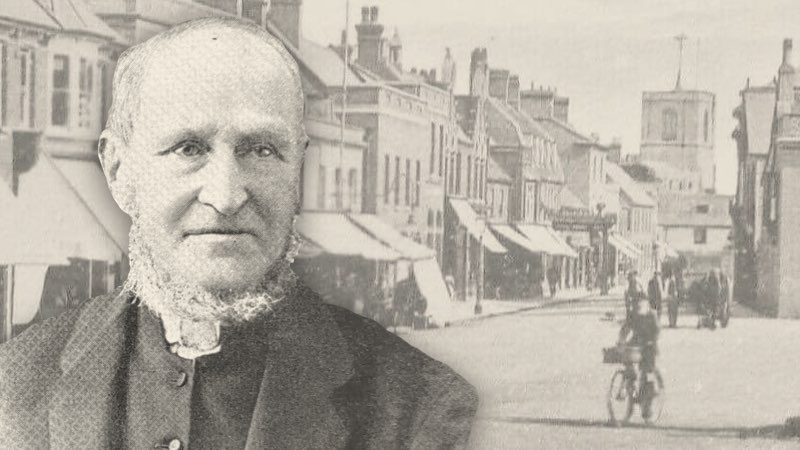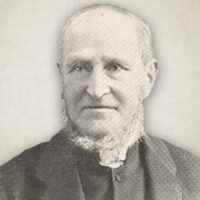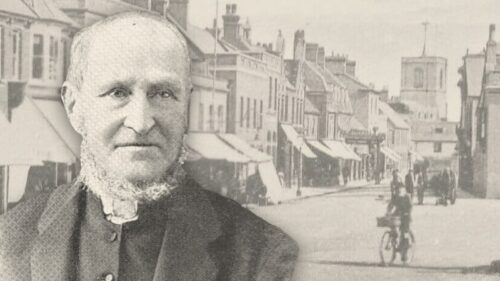
A Book Review: Memorials Of The Late John Warburton
Earthen Vessel 1892:
Memorials of the Late John Warburton, of Southill. Edited by C. Hemington, Baptist Minister.
“Man’s life a book of history;
The leaves thereof are days;
The letters, mercies closely joined;
The title is God’s praise.”
John Masson.
All who cherish the memory of our now glorified friend, Mr. John Warburton, of Southill, will, we are sure, speedily purchase his autobiography just published, and will thank the editor of it, Mr. C. Hemington, of Devizes, for the able and faithful manner in which he has discharged his work. We have perused the volume with much real pleasure and profit, and heartily commend it to the careful reading of all our friends. The Letters and Meditations it contains are full of precious truth, and well calculated to meet the varied experiences of the tried family of God.
Mr. Hemington, in his excellent preface to the work, says “Mr. Warburton was, in fact, a remarkable man in many ways, and take him for all in all, we shall not soon see his like again. We have never seen a second Huntington, nor a second William Gadsby, nor a second J. C. Philpot, nor a second William Tiptaft; and it is not a little remarkable that we should have had two John Warburton’s, father and son, and both truly honoured servants of God, and able ministers of the New Testament, and both as sound as a rock in God’s truth.”
Some captious persons have found fault with Mr. Warburton’s method of illustrating truth in the pulpit as being “too light and humorous.” We do not, of course appreciate ministers who talk nonsense in the pulpit in order to excite laughter, but we do admire cheerful preachers; and can make every allowance for men of strong minds who think for themselves, and who dare to be themselves, both in the pulpit and out of it. Mr. Remington very justly says, “What we said at his funeral we repeat here—viz. that whenever in hearing him preach, he has dropped in the course of his sermon a humorous remark or two, they have always been followed by such other remarks—solemn utterances of Divine truth, as would, with judicious hearers, counteract any bad effects which might arise from them. We object as much as anyone to levity of manner, odd gestures, and expressions in the pulpit, calculated to put people on the titter. But when, as in the case of Berridge, a vein of humour runs through a man’s character, he will need the grace of an apostle to keep it under subjection; and even with as much grace as that, it will be a wonder if it doesn’t now and then show its face in the pulpit, as well as in the parlour. With some, to be dull is to be holy, and to be melancholy is to be spiritual; but our brother was not quite of that mind, neither are we. Therefore, we cannot say that any little spurts of humorous remark there may have been in our brother’s preaching at the times we have heard him have troubled us. The good in his preaching has often done us good, and that has made us always too glad to hear him whenever we have had the opportunity.”
He was a faithful preacher
“Hence the free, sovereign and unmerited grace of God flashed forth in his preaching, in its pure gospel lustre, undimmed by the mist and vapours of human traditions, and an Arminian creed.” It is perfectly right to preach to sinners within the limits of truth, as Mr. Warburton did. “He preached to sinner and to saint, to the Church and to the world, and took a lively interest in the Christian and Protestant rights and liberties of his country.” Of the English people as a nation, he wrote, quoting in part the words of David (2 Sam. 7:23): “What one nation in the earth is like them? God has given them His Word. He has raised up ministers to open His Word, and some of them of illustrious name. They are embalmed in the memory of the true Church of Christ. Listen, O England! They come with the message of the Lord. There is Huntington, of blessed memory; Gadsby, a deeply-taught man of God; Warburton, by whose message God rejoiced the hearts of hundreds; Kershaw, who sweetly talked of Jesus; Philpot, a man of erudition, by grace becoming a fool, that he might be wise to salvation.” Of himself, as a sinner saved by grace, he says, “What am I a poor worm, weak in knowledge, finite in being. I cannot explain my own changeable existence. If, then, I, a creature of mortality, am lost and confounded in respect of my own temporal existence, how can I define, or even attempt to unfold what God is? This I never have attempted to do, and I hope I never shall. I would prefer saying, I have read of Thee, I have heard of Thee, I have talked of Thee, I have thought of Thee, I have sometimes tried to pray to Thee.” “But,” as Mr. Hemington says, “to comprehend the great Three-One, he (Mr. W.) knew was ‘more than highest angels can.”’
Mr. Warburton’s First Invitation To Preach
The account of the early life of Mr. Warburton is most interesting, as also his letters written when a soldier in Plymouth Barracks; and many are the soul-stirring passages which occur in the volume before us relative to his first invitation to preach, and his settlement at Southill. Respecting his first invitation to preach, he says, “It was either the close of 1843 or the beginning of 1844, one Jonathan Reeves, of Rochester, in Kent, wrote to me that there were a few people met together in a room in Rochester for worship, and that they would be glad, if I felt so inclined, for me to speak to them. They had been informed of my attempting, now and then, to speak from a chapter at a prayer-meeting, in Eden-street Chapel. I think, but am not certain, it was in 1842 that I, with six others, commenced that cause in Gadsby’s-yard, Tottenham Court-road. From there we went to Eden-street. There it was that five out of the seven formed ourselves into a Church. Mr. Gadsby, of Manchester, broke bread to us for the first time, publicly recognizing us as a Church. Mr. Kershaw, of Rochdale, was the first to supply for us in Tottenham Court-road. The Church and congregation now meet for the worship of God in ‘Gower-street Chapel.’ But to return. The note received from Jonathan Reeves exercised my mind not a little. I did not reply at once, my mind was so agitated. Though I had prayed for the thing, believed it would be, and that it was the will of the Lord it should be, yet now I was asked I could not say yes, or no. As I delayed to answer the letter, I had another note urging me to come, as, from some impressions, they felt it was the will of God. That night I went into Regent’s Park to consider the matter. My soul’s cry was, ‘Lord, direct me’; ‘O Lord, go before me’; ‘Lord, send me.’ While thus walking and praying I felt such a love spring up in my heart towards poor sinners, the saints, and Jesus Christ, as I cannot describe. Off I ran, the nearest way home, my soul flowing with love, and wrote to say that, God-willing, I would be with them on Lord’s-day, January 28th, 1844. A day or two after I had sent to say I would go, my mind sunk at the very thought. I wished I might be taken ill. ‘Oh,’ I said, ‘what shall I do! Fool that I man, and fool I have always been.’…Saturday, January 27, 1844, I took my journey to Rochester, arriving there in safety about 5.30 in the evening. The friends with whom I stayed, after tea, showed me into a room, where I could sit alone. Now, I thought, how about the morrow?
My heart began to fail, for nothing fastened upon my mind. I tried to read the Bible, but was so beset with blasphemous thoughts, I shut the book.” When, however, the time arrived for the service to commence the Lord graciously gave him sweet liberty of soul, and he preached with great freedom from 1 Cor. 3:11. On the following day, having returned home, he tells us that he heard the sad news of the death of William Gadsby, which occurred on the evening of Saturday, January 27th, 1844.
To prove that his testimony was much appreciated by the friends at Rochester they soon gave him another invitation, which he accepted and preached to the profit of many who attended the services. In due course, after having served various other causes of truth, he became the pastor of the Church at Southill, where he laboured with marked success for the long period of forty-eight years. We sincerely wish the book a wide circulation. It is neatly bound, and is embellished with a portrait of Mr. Warburton, and a view of Southill Chapel.
John Warburton Jr.(1815-1892) was a Strict and Particular Baptist preacher. He was the youngest of ten children belonging to John Warburton (1776-1857) of Zion, Trowbridge. For fifty years John Jr. served as pastor for the church meeting at Southill, Bedfordshire.




